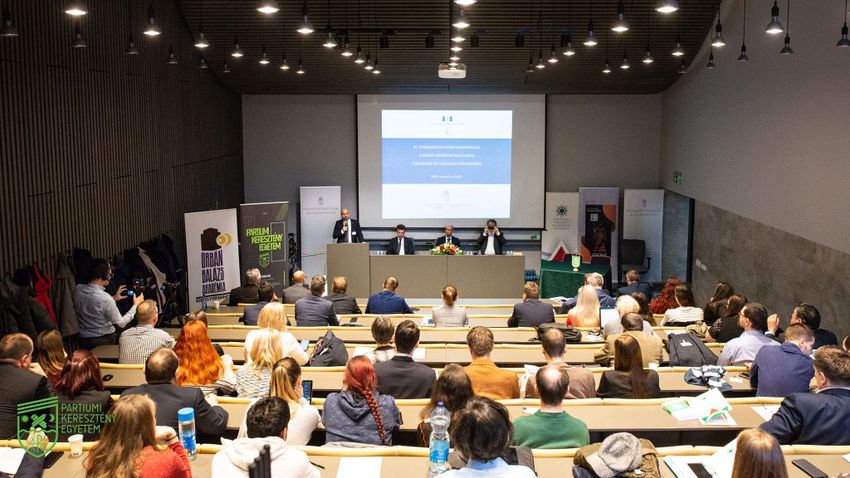Stefania Biko
the fourth. For the first time, an interdisciplinary conference on the socio-economic situation of the Hungarians in the Carpathian Basin went beyond Hungarian borders, and thus within the walls of the Partium Christian University. The theme of the joint conference of the National Institute for Strategic Research, the Urban Palace Institute Society and PKE is People and Society in the 21st Century: Networks, Spaces and Frontier Attitudes, and at the same time issues surrounding the region are discussed. The topics of the scientific meeting were introduced by the National Institute for Strategic Research Vice President and Director of the first item of the program, Marton Petit, in his welcome. The Vice President thanked PKE, which not only provided the venue but was also an important partner in the organization and implementation. Meanwhile, he thanked the Pallas Athena Domus Meriti Foundation (PADME) for its support. In addition to all this, he said that several other organizations supported the establishment of the conference, highlighting some of them, and then calling on Dr. Joseph Balfe, President of PKE University, greeting the attendees.
“It is likely that the Western world, and with it our own world, is moving along the broad-scale boundaries of the era, in which almost everything without exception shouts that today, on the one hand, previous boundaries, identities, norms, and values are not important, and on the other hand, everything that It can be deleted or overwritten. We can see the consequences of all this, because without the former, man or society has fallen into a chaotic crisis of his own making, in which he slowly no longer knows who he is or what he is. (…]Boundaries, identity, norms and questions are connected And the answers of values are closely related, because everyone who does not suffer from self-identity disorders and knows himself knows the limits and knows the natural order, standards and values of life. Joseph Balfe said in his speech. He added that people today are in the process of rewriting the previous values, the previous arrangement, trying to redefine themselves, but because there are no clear boundaries, there is a risk of losing our freedom. He asserted that if we know where the healthy and normal boundaries are, we know what we are responsible for. “We who live in a definite borderline situation anyway, in a cultural buffer, in Partium, understand exactly the importance of this, the role of this.” – Tell.
Then, Jenny Szasz, the head of the National Institute for Strategic Research, addressed the crowd, telling them that he was very proud that the fourth congress was being held outside the Hungarian borders. As he noted, he could return “home”, here believing that as a native of Székelyudvarhely he was closer to his hometown. In his speech, he highlighted: “We owe allegiance and responsibility to the nation, the fatherland, our families, our children, and the Hungarians, we must treat each other with love.” Before the start of the public lectures, the Minister of State for Regional Development Gabor Meyer welcomed the participants, which was also gratifying because the issue of regional development has been taken up at the level of the State Secretariat of Hungary since the middle of this year.
After the public lectures and opening of the Bihar Half Millennium Exhibition in Maps, the Strategic Cooperation Agreement was signed and the Strategic Framework Agreement was signed. The first was created between the Faculty of Economics and Social Sciences of Bartheum Christian University and the National Institute for Strategic Research.
The latter, the Strategic Framework Agreement, was set up between Veszprém Archbishop’s College and PKE. The purpose of the agreement is “To support and engage each other in order to participate effectively and efficiently in scientific, educational and innovative processes, primarily domestic and international.”
Friday’s brainstorming continued on several different topics: changing the world, changing language; Childbirth in the Carpathian Basin. educational positions for Hungarians living abroad; Current field research in Partium. urban areas in the Carpathian Basin; Subregional education and community development. The conference participants concluded the meeting with a city tour.
Photos: Eric Marc Turks












































